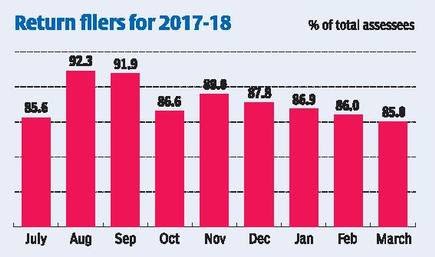The Goods and Services Tax (GST) Council may consider one-time amnesty scheme to facilitate exit for ‘nil’ filers and non-filers.
The Goods and Services Tax (GST) Council may consider one-time amnesty scheme to facilitate exit for ‘nil’ filers and non-filers.
“Approximately there are 25 lakh ‘nil’ filer assessees while on an average 10 per cent of assessees have never filed returns so far,” a senior tax official told Businessline. These assessees do not contribute anything but add to the work of the tax system. “A scheme for exit will bring relief to the tax payers as it will bring down their compliance cost and at the same time there will be less pressure on the GST Network,” he said. An amnesty scheme is a mechanism adopted by the Government to encourage compliance under taxation laws.
According to the law, every person registered under GST will have to file returns in some form or the other. A registered person will have to file returns either monthly (normal supplier) or quarterly basis (supplier opting for composition scheme). An ISD (Input Service Distributor) will have to file monthly returns showing details of credit distributed during the particular month. A person required to deduct tax (TDS or Tax Deducted at Source) and persons required to collect tax (TCS or Tax Collected at Source) will also have to file monthly returns showing the amount deducted/collected and other specified details. A non-resident taxable person will also have to file returns for the period of activity undertaken.
Late fee
Any registered entity not filing return will have to pay penalty in the form of late fee. For late filing of GSTR 3B, the entity is obliged to pay a late fee of ₹50 a day, that is, ₹25 per day in each case of CGST and SGST (in case of any tax liability) and ₹20 a day, that is, ₹10 in each CGST and SGST (in case of Nil tax liability) subject to a maximum of ₹5,000 from the given due date to the actual date when the returns are finally filed. Amnesty scheme is likely to give relief from such fees.
“Initial GST days resulted in lot of non-compliances on account of lack of clarity of law, frequent amendments, GSTN portal issues etc. Thus, an amnesty scheme, which can encourage genuine non-filers to suo moto come out and complete their backlog of non-compliances without any fear of penal consequences, would be a welcome step,” Harpreet Singh, Partner at KPMG, said.
As of now, there are 1.16 crore people registered under GST. These include over 64 lakh who migrated from the old system. During the pre-GST regime, the States had different slabs for registration under VAT/ST, which was as low as ₹1 lakh and could go up to ₹10 lakh: the thresholds for Service Tax and Central Excise were ₹10 lakh and ₹1.5 crore respectively. According to law, all such assessees were migrated to GST. Now under GST, the threshold is ₹20 lakh (₹10 lakh in some States) which means many from the pre-GST regime can take advantage of the amnesty scheme to exit with ease.
“Traditionally, amnesty schemes have generally resulted in increased compliance and tax revenues. However, timing of of the scheme, immunity from penal consequences and commitment to not initiate any investigations for those who participate in such scheme are some critical aspects on which the success or failure of the scheme hinges,” Singh said.
Source https://www.thehindubusinessline.com

